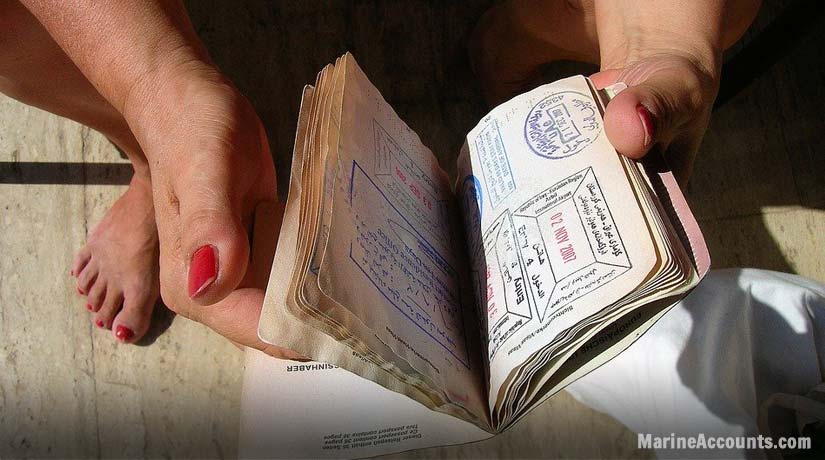COVID-19: Considerations for Yacht Crew
- Authors
-
-

- Name
- Patrick Maflin
-

Image source: https://pixabay.com/illustrations/virus-covid-science-covid19-4937553/
The ongoing global Coronavirus pandemic marks the largest public health crisis in recent history.
Great concern is being given to the health of the population and attempts to minimise the severity of the virus are being deployed rapidly.
The global economy is also destined to suffer largely as a result of the virus.
Governments of the more heavily affected nations around the world have been implementing more severe measures as the crisis deepens, with several nations in Europe, as well as the United States of America, imposing travel bans or turning to a state of complete 'lockdown'.
The nature of employment in the yachting industry means that crew like yourselves are impacted in differing ways to the general population.
Not only have the itineraries of yachts deviated drastically from their usual operations but many ports, especially around the Mediterranean, have imposed a policy of restricting entrance and exit for vessels.
Furthermore, if you are lucky enough to be based in a port that has remained open, countries are limiting people entering that have previously visited affected nations.
With the situation constantly evolving, it is difficult to say how circumstances will develop in the coming weeks.
However, with rumours that the US will be closing their borders entirely, and similar measures destined for Europe, it is safe to assume that travel will soon be completely restricted.
In this article we explore the various issues surrounding COVID-19 and how this affects yacht crew.
Read on to find out more or click a jump menus below to skip to a chapter that interests you.
Chapters
- Complying with Your Visa
- Residency Concerns
- UK Crew & the Seafarers Earnings Deduction
- Conclusion
- Speak to Us or Comment!

Image source: https://pixabay.com/photos/pass-passport-visa-stamp-2260989/
Complying with Your Visa
With movement limited, it is imperative that crew affected by the travel restrictions give consideration to the requirements of any Visas that limit the amount of time that can be spent in a particular country.
The two main variations of Visa that are most commonly seen are Schengen and B1B2 Visas, permitting travel to Europe and the United States respectively.
With travel between some areas already restricted, you may find yourself being left with no choice but to remain in the country that you are currently in.
It is still unknown how long the current crisis will continue for and subsequently you may find yourself spending extended periods in a country that you had not previously planned to.
With a B1B2 Visa permitting a 6-month stay in the United States, and a Schengen Visa allowing a 90-day stay in any 180-day period, it is not out of the question that holders of either type of Visa will find themselves approaching the limit.
If you hold a Visa that contains time restraints, it is advisable to check how long you have remaining on the Visa and if necessary, apply to extend your Visa as soon as possible.

Image source: https://pixabay.com/photos/globe-connections-concept-logistics-4872998/
Residency Concerns
Extended stays in countries can also cause issues relating to taxation to arise.
With it being difficult to say how long this saga will continue for, it is advisable to ensure that you understand your position and obligations that may arise as a result of this.
A key determinant when considering an individual’s position of tax residency is the amount of time that the individual has spent in a given country.
Typically, exceeding 183 days in either a calendar year or 365-day period will class you as a resident of that particular country.
This is the prevailing residency rule in nations such as France and Spain.
If you are considered to be a tax resident of a particular country, you will be required to declare your worldwide income in said country and pay the prevailing rate of income tax.
It is therefore vital that you do not find yourself in a position of tax residency in an alien country.
However, the rules surrounding tax residency vary from country to country and these can be complex to understand.
If you are unsure of your residency position and how to act, our tax consultation service will give you a clear and concise understanding of your residency position. Feel free to get in touch with us today.

Image source: photo-1470923267153-a9effefa7551
UK Crew & the Seafarers Earnings Deduction
Crew that are engaged in employment across the globe are seeing their employers sending them home in light of the developing health crisis.
Whilst this is undoubtably the correct thing to do, UK crew are faced with a dilemma due to the constraints on time allowed in the UK as part of the qualifying criteria of the Seafarers Earnings Deduction (SED).
Extended periods in the UK may lead you to break your qualifying period for the SED.
As it remains to be seen how long it will be until crew are allowed back to work, it is a real possibility that you may break your qualifying period.
A failure occurs if at any time during the claim period you:
- spend 183 or more continuous days in the UK, or
- break the half-day rule.
The half-day rule is applied at each return to the UK.
All days since the start of the claim are added and divided by 2 (A).
Then all days spent in the UK since the start of the claim are added (B).
The two figures are compared and where (B) exceeds (A) there will be a failure in the claim period.
The claim period ends on the previous return date.
A new claim period must then commence from the earliest possible date of leaving the UK.
If you find yourself in the position of breaking your qualifying period after long periods in the UK, it is not a reason to panic.
Firstly, your income from working at sea up to the point where your qualifying period was broken remains eligible to be declared under the Seafarers Earnings Deduction with a 100% income tax exemption.
Secondly, reinstating your qualifying period is straightforward once things return to normal further down the line.
From the date that you leave the UK to return to work, you must spend 183 days outside of the UK in the subsequent 365 days.
If you achieve this, your income from working at sea that you earned in the period since returning to work would be eligible to be claimed under the SED as normal (ensuring that you meet the other SED qualifying criteria, more information can be found here).
Our SED test gives you clarification on whether you qualify for the SED, and how you can claim your 100% income tax exemption.
Conclusion
With the situation evolving daily, it is difficult to accurately predict the state of affairs in the coming weeks, but it is important to ensure that you are safe by taking necessary precautions and following government guidance.
We understand that this can be a confusing and stressful time, but we are here to help.
Speak to Us or Comment!
Whether you are concerned about your tax situation or are UK crew looking for clarification on how you can maintain your SED eligibility, get in touch today and we will assist you.
Contact Marine Accounts today or let us know your thoughts in the comments section below.
Liked this article? Try reading:
Seafarers Earnings Deduction: The Most Frequently Asked Questions - Answered!
Any advice in this publication is not intended or written by Marine Accounts to be used by a client or entity for the purpose of (i) avoiding penalties that may be imposed on any taxpayer or (ii) promoting, marketing or recommending to another party matters herein.


